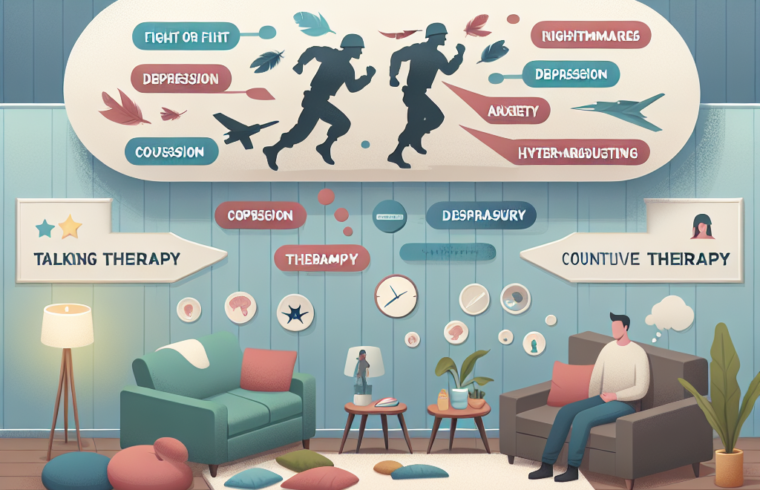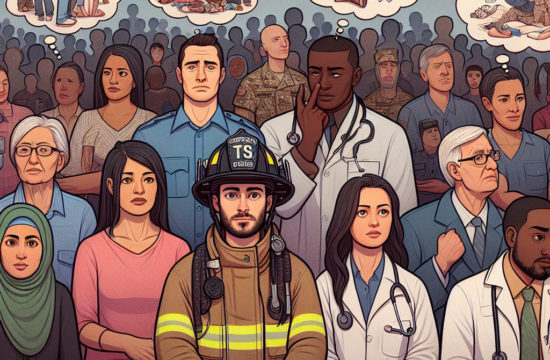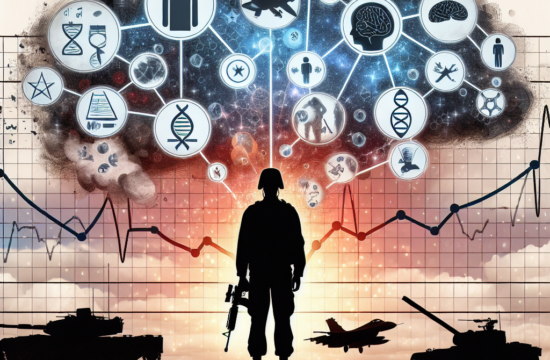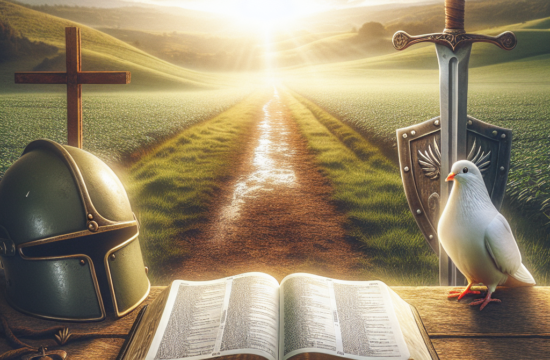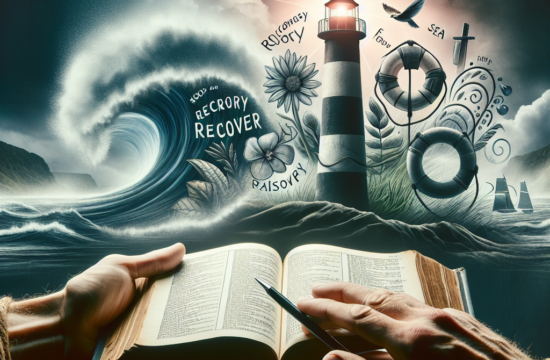Get Started with Recovery! Visit us for more Information and Support
==> Thank you for reading this post! Click Here If you are looking for support and Victory over PTSD.
What You Need to Know About Combat Trauma Therapy
- Understanding Combat Trauma
- Signs and Symptoms of Combat Trauma
- Types of Combat Trauma Therapy
- The Importance of Professional Help
Understanding Combat Trauma
What is Combat Trauma?
Combat trauma, often referred to as combat-related PTSD, is a condition that affects veterans and active-duty service members who have experienced life-threatening events in war zones. From my own experience, it can feel like carrying a heavy backpack filled with memories that you just can’t shake off.
It’s not just the physical injuries; it goes deep into emotional wounds that might not be visible to others. I often describe it as a cloud that hangs over your head. You can’t see it, but you sure can feel it.
The aftermath can lead to a myriad of challenges—anything from anxiety to emotional numbness. Understanding what combat trauma is lays the foundation for healing, and trust me, that’s an important step in the journey.
Who is Affected?
Combat trauma doesn’t discriminate. It can affect anyone who has seen action, regardless of their rank or time served. I’ve met service members who were on their first tour and those who’ve been in the game for decades. Each story is unique, but the emotions tied to them resonate on a universal level.
The age, gender, and background of those affected varies widely. While men have historically been the focus, it’s crucial to recognize that women veterans face this trauma too. The more we open the conversation about it, the better we can identify those who need help.
Why Understanding Matters
Knowing what combat trauma involves not only helps those affected but also gives friends and family members tools to support their loved ones. The more awareness we bring to this issue, the less isolation the victims feel—because let’s be honest; isolation is a sneaky little beast that can make everything worse.
Understanding also fosters compassion. Remember, when we talk about mental health, it’s not a sign of weakness; it’s a sign of strength—and that’s a lesson we all need to embrace.
Signs and Symptoms of Combat Trauma
Physical Signs
Combat trauma can manifest in several physical ways. You may notice things like fatigue, headaches, or even muscle tension. I can’t tell you how many times I’ve rolled my shoulders and realized they felt like granite—that’s my body’s way of signaling stress.
Other physical symptoms might include changes in sleeping patterns. Ever had nights where you just couldn’t close your eyes, or maybe you’d sleep for a bit but wake up feeling like you’ve run a marathon? That’s a classic sign of combat trauma.
It’s essential to keep an eye on these signs and not just brush them off as burnout or stress from daily life. They’re your body’s way of telling you something’s off.
Emotional and Psychological Symptoms
The emotional toll can be overwhelming. You might feel irritable or angry, and those little things that never used to bother you might start to send you through the roof. I used to feel guilty for losing my patience; it felt so out of character.
It’s also common to feel a sense of numbness, like you’re walking through life in a bubble. You might struggle with flashbacks or intrusive thoughts, which are especially tough. When your mind plays scenes from the past like a broken record, it’s difficult to find peace.
And let’s not forget the anxiety that surfaces like an unwelcome guest. It’s like that familiar knot in your stomach that just won’t loosen. Recognizing these symptoms is crucial because acknowledgment is the first step toward healing.
Social Withdrawal
Many people experiencing combat trauma feel the urge to isolate themselves. I’ll be honest—it can be tempting to avoid social situations altogether. When you’re surrounded by people but can’t connect, it feels like you’re on a different planet.
This withdrawal can lead to strained relationships with friends and family. They may notice your absence and wonder what’s going on, but you might feel too overwhelmed to explain. Talking about mental health can be awkward and scary, and that’s okay.
Yet, social support is vital. Finding ways to reconnect, even if it means starting small, can open the door to healing. Remember, you’re not alone in this.
Types of Combat Trauma Therapy
Talk Therapy
One of the most common forms of therapy is talk therapy, also known as psychotherapy. I remember sitting in my therapist’s office, pouring out my heart, and realizing that simply talking about it was a massive relief. It felt good to let the weight off my shoulders.
There are various forms of talk therapy, including Cognitive Behavioral Therapy (CBT) which focuses on changing negative thought patterns. This was a game changer for me. It helped me see that my thoughts were not facts.
Finding a therapist who understands combat trauma is crucial. You want someone who can mold the process around your experiences and help you navigate the complexities of your emotions.
Group Therapy
Group therapy is another avenue worth exploring. Sharing your experiences in a safe space with fellow veterans can be incredibly cathartic. I remember my first group session; the shared understanding between us was like a warm blanket in a cold room.
It’s liberating to talk to someone who “gets it” without needing to explain every little detail. Those shared moments help to dismantle the stigma around therapy, too. It’s powerful to see that others are going through the same battles.
The connections formed during group therapy can be lifelong assets. You’re not just talking; you’re building a support network that will stand with you through the ups and downs.
Complementary Therapies
Complementary therapies like yoga, meditation, or art therapy can also play a significant role in combat trauma recovery. I’ve found that activities like yoga help to ground me, reconnecting my body and mind in ways that traditional talk therapy can’t always reach.
Creative outlets—like painting or drawing—can serve as a non-verbal way to process deep feelings. It’s about expressing emotions without the need for words, and boy, is that liberating!
Integrating these into your recovery plan could pave the way for a more holistic approach. The aim is to find what resonates with you and what helps your spirit soar.
The Importance of Professional Help
Why Seek Professional Help?
It can be tough, but seeking professional help is a crucial step. I can share from personal experience that going it alone often leads to deeper emotional wounds. Sometimes, the bravest thing you can do is to reach out for help.
Professionals have tools—real, valuable tools—that can lead you toward healing. They provide a safe environment for you to unload, explore, and confront your feelings. It’s empowering to know you’re not alone in this journey.
The Role of Family and Friends
Your support system plays a vital role, too. Well-intentioned family and friends can help bridge the gap to professional help, whether it’s encouraging a loved one to book an appointment or just being there to listen.
It can feel awkward at times, but having those chats about mental health can break down barriers. Encourage your loved ones to seek help when necessary, lending that support can be life-changing.
Finding the Right Therapist
Not all therapists will be the right fit, and that’s okay. I’ve had to kiss a few frogs before finding my therapist match. Shop around a bit; it’s about finding someone who’s not just a professional but someone you can connect with on a human level.
Take your time, ask questions about their experiences with combat trauma, and trust your instincts. This journey is personal, and you deserve someone who truly gets it.
FAQ
What is combat trauma?
Combat trauma refers to the psychological and emotional effects that arise from experiencing traumatic events during military service. It often manifests as PTSD and can impact a person’s daily life significantly.
How do I know if I or someone I know has combat trauma?
Signs may include emotional numbness, anxiety, withdrawal from social situations, flashbacks, or physical symptoms like fatigue. It’s important to seek a professional evaluation if you suspect combat trauma.
What types of therapy are effective for combat trauma?
Talk therapy, group therapy, and complementary therapies (like yoga and art therapy) have proven effective. It’s about finding what works best for the person experiencing the trauma.
Why is professional help essential for dealing with combat trauma?
Professionals provide tools, insight, and a safe environment to explore difficult emotions. Healing is a complex journey, and having the right support makes a world of difference.

